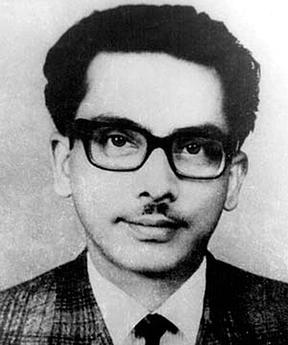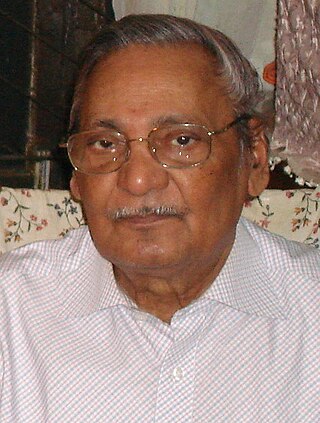Shamsul Huda | |
|---|---|
শামসুল হুদা | |
 | |
| Born | 1 December 1932 |
| Awards | Ekushey Padak (2014) |
Shamsul Huda (born 1 December 1932) [1] is a Bangladeshi language activist. He was conferred with Ekushey Padak in 2014 for his contribution to the Language Movement. [2]
Shamsul Huda | |
|---|---|
শামসুল হুদা | |
 | |
| Born | 1 December 1932 |
| Awards | Ekushey Padak (2014) |
Shamsul Huda (born 1 December 1932) [1] is a Bangladeshi language activist. He was conferred with Ekushey Padak in 2014 for his contribution to the Language Movement. [2]
Huda was born on 1 December 1932 to Md. Idris Mia and Rahima Khatun in the island village of Char Chandia off the coast of Sonagazi, Feni, then part of the Noakhali district of the Bengal Presidency. [1] He completed his matriculation from Noakhali. Later, he completed higher secondary studies from Dhaka College. Huda graduated from University of Dhaka. [1] He passed MA from University of Karachi. Later, he received MS degree from University of New South Wales. [1]
Huda took part in the Language Movement. He was among those people who raised objection against the remark of Muhammad Ali Jinnah on state language on the convocation of the University of Dhaka on 24 March 1948. [3] He also took part in protest rallies on 21 February 1952. For taking part in this movement he was arrested. [3] He did not get job from Central Superior Services for his involvement in the Language Movement. [1]
Huda started his career in Directorate of Mass Communication in 1957. He retired from his job in 1989. [3] A book titled Vashasoinik Shamsul Huda : Jiboner Jolchhobi was published on 5 September 2015 by Vasha Andolon Gobeshonakendro O Jadhughar which was based on his biography. [4]
Huda received Ekushey Padak in 2014 for his contribution to the Language Movement.

Dhaka Medical College and Hospital (DMCH) is a public medical college and hospital located in Dhaka, Bangladesh. Established in 1946, the college houses a medical school as well as a tertiary care hospital on its campus.

Shahidullah Kaiser was a Bangladeshi novelist and writer. He was awarded Bangla Academy Literary Award in 1969, Ekushey Padak in 1983 and Independence Day Award in 1998.

Syed Mujtaba Ali was a Bengali writer, journalist, travel enthusiast, academic, scholar and linguist. He lived in Bangladesh, India, Germany, Afghanistan and Egypt.

Ekushey Padak is the second highest civilian award in Bangladesh, introduced in memory of the martyrs of the Bengali Language Movement of 1952. The award is given to recognize contributions in a number of fields, including culture, education, and economics. The Ministry of Cultural Affairs administers the award.

Abdul Matin was a language activist of the Bengali Language Movement that took place in the erstwhile East Pakistan to make Bengali one of the state language of Pakistan. He was one of the student leaders and organizers of the movement. His contribution to the movement has been hailed by the other activists and students as he was popularly known as Bhasha Matin.
Ajoy Roy was a Bangladeshi professor of physics at the University of Dhaka, but was best known for his prominent role in Bangladesh's human rights activism and freethinking. He was one of the eminent educationists promoting secular humanism in Bangladesh.

Emajuddin Ahamed was a Bangladeshi political scientist, author and educationist. He served as the 21st vice-chancellor of the University of Dhaka during 1992–1996. He was awarded Ekushey Padak in 1992 by the Government of Bangladesh in the education category.

Qayyum Chowdhury was a Bangladeshi painter. Along with Zainul Abedin, Quamrul Hassan and Safiuddin Ahmed, he is considered as a first generation artist of Bangladesh. He was awarded the Ekushey Padak in 1984 and the Independence Day Award in 2014 by the Government of Bangladesh.
Jharna Dhara Chowdhury was a Bangladeshi social activist.
Abu Taher Mohammad Shamsuzzaman, was a Bangladeshi film and television actor, director and screen-playwright. He was awarded Ekushey Padak in 2015 by the Government of Bangladesh. He won Bangladesh National Film Awards five times for his roles in Dayee Ke? (1987), Madam Fuli (1999), Churiwala (2001), Mon Bosena Porar Table E (2009) and Chorabali (2012).

Kamal Lohani was a Bangladeshi journalist. He was awarded Ekushey Padak in 2015 by the Government of Bangladesh. He served as the director general of Shilpakala Academy from April 2009 until April 2011.
Sayed Haider was a Bangladeshi physician and Language Movement activist. He along with Badrul Alam designed the first Shaheed Minar. It was then demolished by the Pakistani Army on 26 February 1952. For his contribution to the Language Movement he was awarded Ekushey Padak in 2016.
H H Sanghanayaka Suddhananda Mahathero was a Bangladeshi Buddhist monk. He was awarded Ekushey Padak in 2012 by the Government of Bangladesh for his contribution to social work. He served as the President of Bangladesh Bouddha Kristi Prachar Sangha.
Monzur Hossain (1928–1968) was a Bangladeshi language activist and physician. He was conferred with Ekushey Padak posthumously in 2002 for his contribution to the Language Movement.
Khaleque Nawaz Khan was a Pakistani Bengali language activist, politician and lawyer belonging to Awami League. He was a member of the East Bengal Legislative Assembly. He was conferred with Ekushey Padak posthumously in 2008 for his contribution to the Language Movement.
Badrul Alam was a Bangladeshi language activist, physician and medical academic. He designed the first Shaheed Minar. He was conferred with Ekushey Padak posthumously in 2014 for his contribution to the Language Movement.
Tofazzal Hossain was a Bangladeshi language activist, civil servant, journalist, poet, lyricist and writer. He was conferred with Ekushey Padak in 2013 for his contribution to the Language Movement.
Jasim Uddin Ahmed was a Bangladeshi language activist, nuclear physicist, poet and author. He received the Ekushey Padak award in 2016 for his contribution to the Language Movement.

Md. Shamsul Haque was a Bangladesh Awami League politician and a Jatiya Sangsad member representing the Mymensingh-2 and Mymensingh-15 constituencies. He was elected to parliament from Mymensingh-11 as a Bangladesh Awami League candidate in 1991 and 1996.